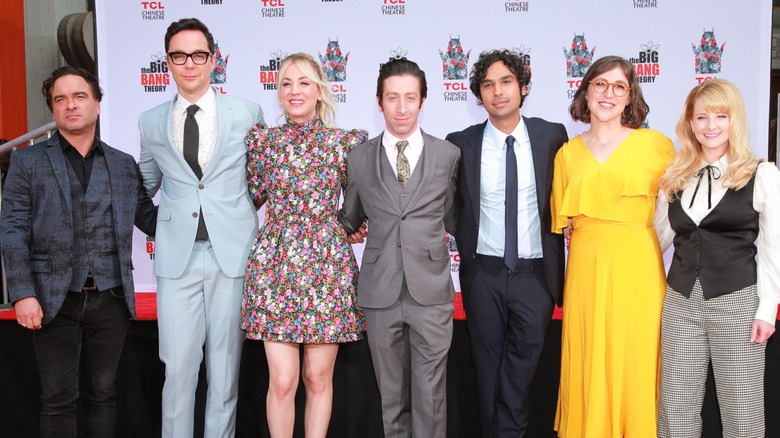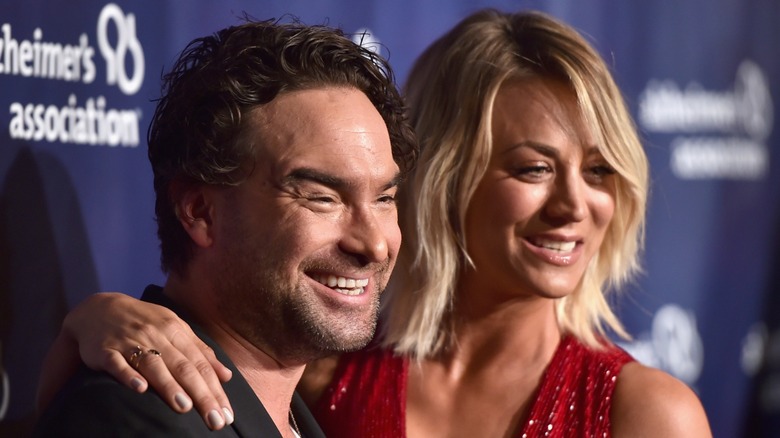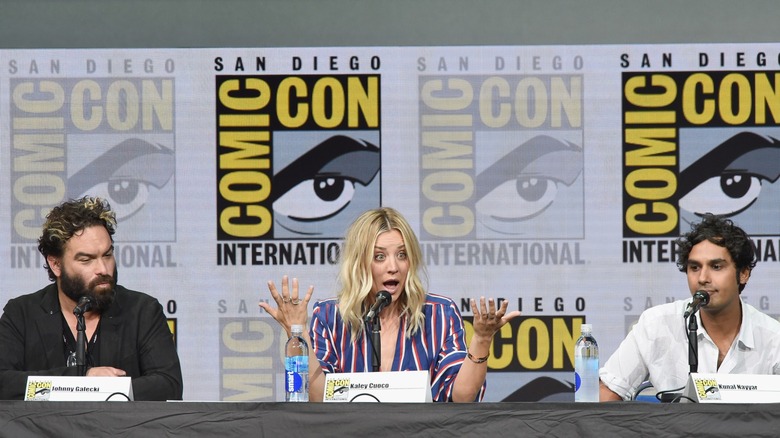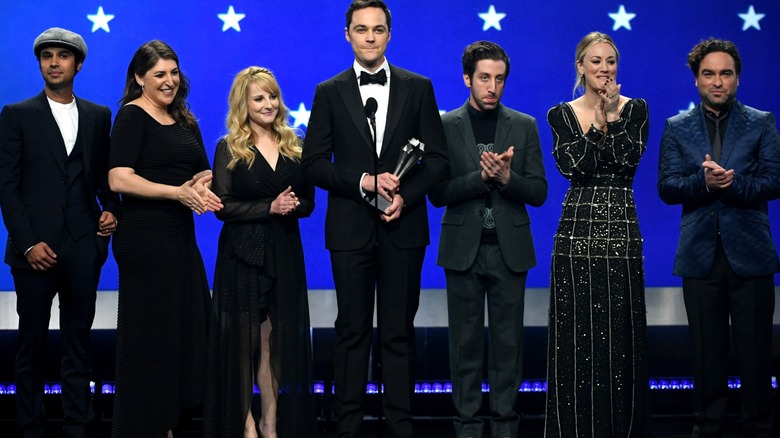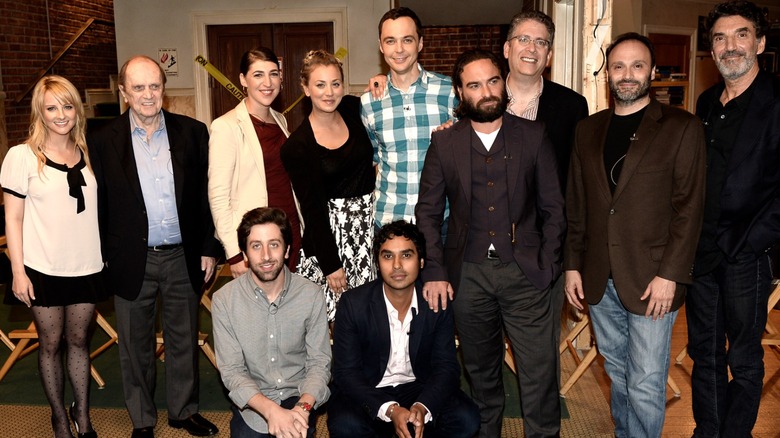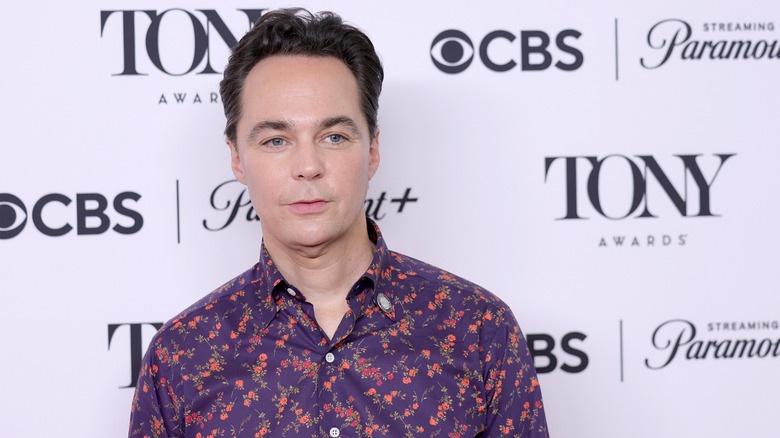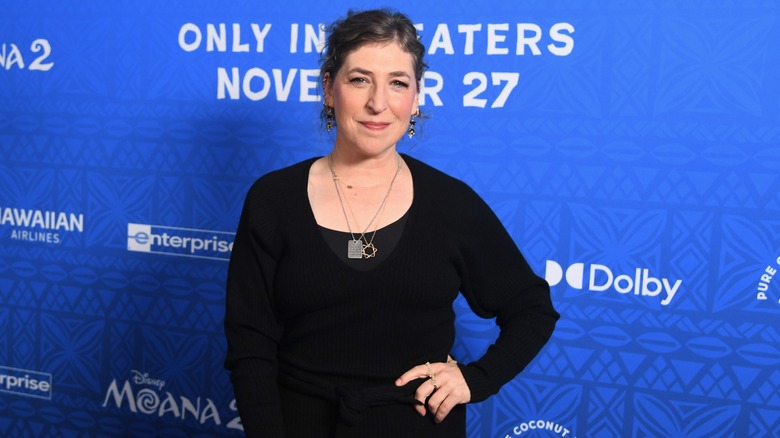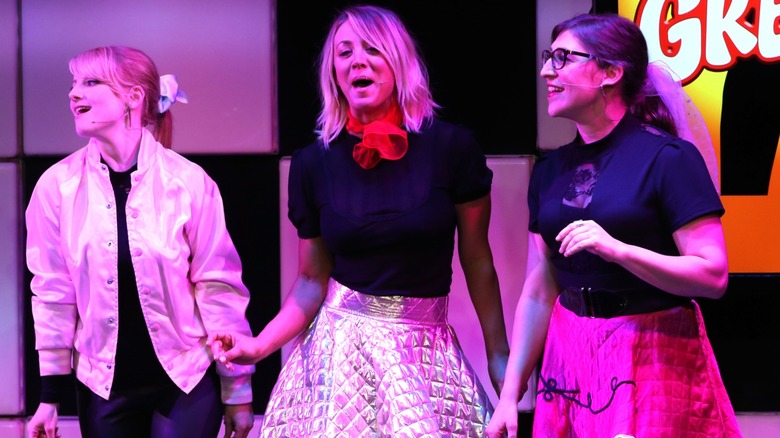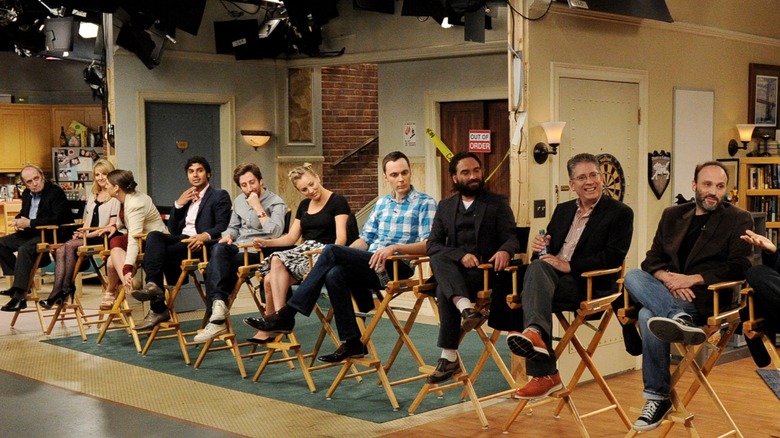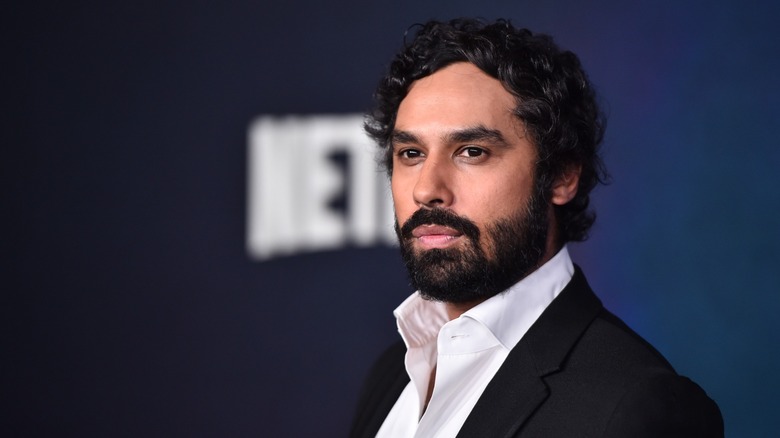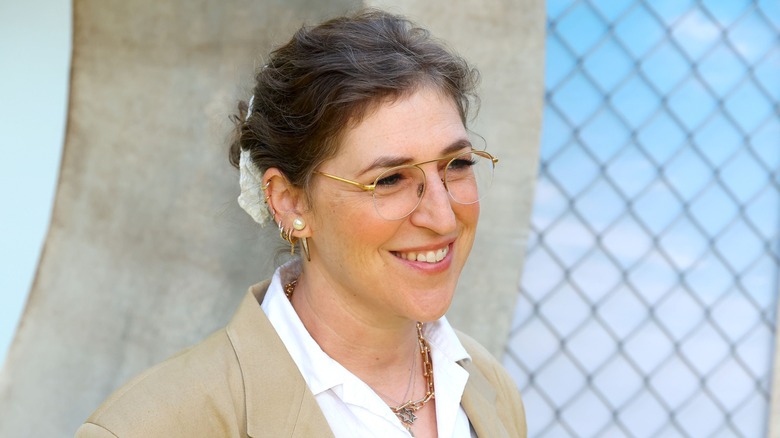Big Controversies That Completely Rocked The Big Bang Theory Cast
"The Big Bang Theory" cast became acting royalty after the show first premiered in 2007. Its popularity rose and rose, peaking in its seventh season when it averaged a jaw-dropping 20.4 million viewers per episode. Over the years, the show earned 10 Emmys, 14 People's Choice Awards, and a Golden Globe. But maybe most impressively, the show became the longest-running multi-camera comedy TV show and had a scene that broke a Guinness World Record for viewing figures. However, the cast's rise to the top hasn't been without a lot of controversy.
Although the show was blessed to have such a high number of eager viewers tuning in, it increased the spotlight on its cast who were unable to stay away from controversies. From doomed work romances to pay-cut disputes and even insulting entire nation-states, between 2007 and 2019 the cast of "The Big Bang Theory" put their foot in it more than once. These were controversies that no amount of awards or "Bazinga" jokes could have covered up.
Kaley Cuoco and Johnny Galecki fell for each other while they were with other people
Any breakup can be hard, but when you have to see your ex at work every day it has to be doubly hard. Look no further than Kaley Cuoco and Johnny Galecki's relationship. The former lovebirds first met on the show, when they were both in separate relationships. As Cuoco later shared, it didn't take long for her to fall for Galecki. Looking back on this period for the show's oral history, "The Big Bang Theory: The Definitive, Inside Story of the Epic Hit Series," she said, "He has such swagger. We were both dating people at the time, but I only had eyes for Johnny. Then, when I found out he had eyes for me too, I was like, Uh‑oh, this is going to be trouble."
As the two continued to see other people, Cuoco and Galecki's chemistry only continued to blossom. They finally made it official after Cuoco split from her boyfriend — but unlike, say, co-stars turned couple Ariana Grande and Ethan Slater, they kept things entirely under wraps. After their secret romance ended, Cuoco told CBS Watch! Magazine (via TV Guide), "We never spoke a word about it and never went anywhere together. That's not the kind of relationship I want." We can't help but wonder what their respective exes thought when they learned of Cuoco and Galecki's courtship.
While their breakup wasn't easy, Cuoco and Galecki continued to work together and have remained in each other's lives. "Yes, there was some hurt there for a bit, but it didn't take us that long to go back to what we were before we were dating and be friends," Cuoco said in the oral history.
The laugh track loomed over the show's legacy
Like many multi-cam sitcoms,"The Big Bang Theory" featured a laugh track throughout each episode. However, some fans might argue that the show leaned too heavily on audience reaction. In 2012, YouTuber sboss posted some clips of the show without the laugh track that feel less like a comedy and more like a tense art-house family drama. As a commenter noted, "Without a laugh track, this looks like a bunch of people who really hate each-other, there isn't a joke in here at all." One of the videos has been watched over 5 million times.
The laugh track-free clips left some viewers to wonder whether the show's dialogue was actually funny or if they were just laughing along because laughter is contagious. "Try watching some episodes without the laugh track. It's super cringe," one Reddit user wrote. Another added, "Obviously I understand why they pause and that it's not meant to be watched in that way but it's still super weird."
For the record, Chuck Lorre told The Wrap they never used "fake laugh stuff" on the show because they wanted the audience's genuine response. According to the series creator, it was important that the laughter was natural and earned. "If you've been to tapings, you know that silence is horrifying. But it tells you that you've made a mistake," he said. While the actors never explicitly addressed the chatter about the laugh track, they have stood by the show's humor. As Melissa Rauch told HuffPost, "[Y]ou don't want to mess with what they write because it's almost like this beautiful concerto that you don't want to mess up one note of."
Jim Parsons made a career move that turned the show upside-down
In the summer of 2018, "The Big Bang Theory" cast sat down to do a script read-through for the new season. Unbeknownst to most of the cast members, this would ultimately be their final season. However, Jim Parsons apparently saw the writing on the wall. Shortly after the table reads began, Parsons announced he would be leaving the show. As the saying goes, all good things must come to an end.
In "The Big Bang Theory: The Definitive, Inside Story of the Epic Hit Series," Kaley Cuoco recounted the moment the cast was told the news. "We cried for hours... We thought we were going to do another year, so all of a sudden your life kind of flashes before your eyes. I looked at Chuck and said, 'What are we going to do?' I couldn't breathe. It just felt like a death," she remembered (via TVLine).
Parson's co-stars were without question rocked by his announcement. Johnny Galecki told the aforementioned book he was "blindsided"; Cuoco texted producer Steve Molaro to say she didn't feel like working and was upset with Parsons. Although the tension eventually thawed, the show still more or less ended because Parsons called it. The other stars would've presumably made a boatload of cash if they stayed on for two more seasons — Parsons alone was reportedly offered a whopping $50 million to stick around — but the network apparently decided there was no "The Big Bang Theory" without Sheldon.
It was a show about nerd culture that angered nerds
In the late '00s, nerd culture went mainstream. The era was dominated by the Marvel Cinematic Universe, "Game of Thrones," and, well... "The Big Bang Theory." It rode the wave of superheroes and supernatural kings and queens which saw a previously uncool subculture become culture. Alas, many members of the subculture apparently didn't respond well to the series' humor.
Some viewers felt that the show was laughing at nerds and geeks, not with them. As one Redditor put it, "In ['The Big Bang Theory'], nerd culture itself is the joke. I remember one episode where Sheldon said he was playing N64 on an emulator, and the laugh track played. ... That was the joke, the idea that someone would want to play an N64 game on a computer was the punchline." What's more, actual scientists thought "The Big Bang Theory" lacked authenticity. Science writer Naomi Dinmore echoed these criticisms of the show in an opinion piece for I, Science: "All the male scientists on the show are lumped into this nerdy stereotype, even though there are plenty of scientists in real life who do not conform."
While the show might've alienated some viewers, evidently, making nerd culture the butt of the joke wasn't the intent. As actor Mayim Bialik told The Guardian in 2015, "[W]e hope that 'The Big Bang Theory' is changing the way people think of nerds and geeks by showing them having active social lives and relationships. I think that is an important way to portray them."
Sheldon's song sparked some legal drama
Any "The Big Bang Theory" worth their weight in salt knows "Soft Kitty," or the song that Sheldon needed to hear every time he was under the weather. However, in 2015, the daughters of Edith Newlin sued the show for using this tune. "Soft Kitty" was based on a 1930s nursery rhyme that Newlin penned called "Warm Kitty," but apparently, "The Big Bang Theory" didn't reach out to Newlin's descendants for permission before making it a recurring bit on the series. Rather, the show's creators found the song in a music book from 1937, made a few tweaks, and got permission from the publisher to use it. So, the lawsuit was ultimately dropped.
Alas, according to Newlin's daughters, they actually owned the copyright to the song, and they weren't thrilled to see the series make a boatload off their mother's work. "The 'Soft Kitty' lyrics are among the best-known and most popular aspects of 'The Big Bang Theory,'" the claim stated, as reported by The Guardian. "They have become a signature and emblematic feature of the show and a central part of the show's promotion." Jim Parsons, who played Sheldon, never addressed the scandal publicly.
As messy as all of this might've been behind the scenes, the cast seemed to put the drama behind them. "Soft Kitty" continued to pop up on the show, making its final appearance in a Season 12 episode, which aired in 2019.
Mayim Bialik made some controversial comments when she was on the show
"The Big Bang Theory" actor Mayim Bialik has made a lot of waves over the years. In 2009, she told People (via the Mirror U.S.) that her kids were not vaccinated, and she offered her reasoning for this controversial move. "We based our decision on research and discussions with our pediatrician, and we've been happy with that decision," she said. Three years later, she dug her heels in further with an op-ed for Kveller where she recommended some books by anti-vax authors. Evidently, the backlash got to be too much: In 2015, she insisted she actually was not anti-vax and that her kids are indeed vaccinated. In 2020, she stated that she would be getting the COVID-19 vaccine, her first vaccination in decades.
But that wasn't the only time she found herself in hot water. In 2017, Bialik wrote an op-ed in The New York Times titled, "Being a Feminist in Harvey Weinstein's World." In the piece, she seemed to imply that because she doesn't present a certain way, she's protected herself from sexual harassment. "As a proud feminist with little desire to diet, get plastic surgery or hire a personal trainer, I have almost no personal experience with men asking me to meetings in their hotel rooms," she wrote. "Those of us in Hollywood who don't represent an impossible standard of beauty have the 'luxury' of being overlooked and, in many cases, ignored by men in power unless we can make them money." Her remarks, which came in the wake of the #MeToo movement, were taken to task by social media and traditional media alike. Bialik later apologized for her comments.
The Big Bang Theory has been accused of being a sexist show
Over the course of its run, "The Big Bang Theory" caught a lot of heat for what some critics felt were sexist jokes and storylines. In 2017, The Pop Culture Detective called out the show's characters as "Adorkable Misogynists," defining the term as "male characters whose geeky version of masculinity is framed as comically pathetic and endearing." The blog post went on to suggest that because the characters present as harmless underdogs, they're held to a different standard when it comes to their treatment of women.
It's a searing critique, but members of the cast have made comments that didn't help the show beat the allegations. In a 2015 interview with Redbook, Kaley Cuoco stated that she doesn't identify as a feminist (via the BBC). "I was never that feminist girl demanding equality," she declared. Understandably, this took a lot of heat, and she ultimately walked her remarks back.
The backlash to her comments clearly rocked Cuoco. Even when greeted with success at the People's Choice Awards in early 2015, she conceded she was still on her "apology tour."
A pay dispute led to 'trash-talking' behind the scenes
In 2017, the cast of "The Big Bang Theory" was at the center of a major dispute regarding pay that rocked their dynamic, with two female cast members receiving significantly less pay than their male counterparts. Rewind to 2014, and the CBS show's five original stars — Jim Parsons, Johnny Galecki, Kaley Cuoco, Simon Helberg, and Kunal Nayyar — were making $1 million an episode. Their fellow co-stars Mayim Bialik and Melissa Rauch, who joined the cast later, brought in $200,000 per episode. It's a pay gap that would turn the most friendly co-stars into enemies – even the friends in "Friends" weren't content with such pay disparity as they faced a similar issue during their run.
The dispute reportedly caused ructions between siome "The Big Bang Theory" stars, and there were some rumors about how it impacted Kaley Cuoco and Mayim Bialik's off-screen dynamic. After Bialik told the New York Daily News "we are all overpaid," Cuoco apparently took that personally. An unnamed source claimed to RadarOnline.com, "Kaley is furious at Mayim for trash-talking her earnings. She thinks it's just a case of sour grapes and jealousy." You know what they say, money doesn't solve your problems.
Evidently, the controversy was put to bed in 2017. The fortunate five took a $100,000 pay cut per episode and boosted Bialik and Rauch's salaries to $450,000. Although it's not quite equal pay, it did at least keep the show's cast together until 2019.
A line from Season 2 received negative press in India years later
"The Big Bang Theory" earned fans around the world. It also earned critics around the world. In a since-deleted X post from March 2023, Indian political analyst Mithun Vijay Kumar shared that he took serious issue with a line from Season 2, Episode 1. In one scene, Sheldon (Jim Parsons) and Raj (Kunal Nayyar) argue about two Bollywood stars. At one point, Raj states, "Aishwarya Rai is a goddess. By comparison, Madhuri Dixit is a leprous prostitute."
This exchange prompted Kumar to take legal action. "Recently, I came across an episode of the show Big Bang Theory on Netflix where Kunal Nayyar's character uses an offensive and derogatory term to refer to the legendary Bollywood actress @MadhuriDixit," he wrote (via The Things). "I found it highly derogatory and offensive towards Indian culture and women. So I asked my lawyer to send a legal notice to Netflix, requesting that they remove the episode from their platform." Netflix ultimately dodged the dispute by basically telling Kumar to take it up with Warner Bros.
The Times of India noted that after Kumar went public with his statement, a number of public figures spoke out against the line in question. Indian actor and politician Jaya Bachchan specifically called out Nayyar, who was raised in New Delhi. "Is this man insane? ... His family should be asked what they think of his comment," she said. Nayyar never responded to the backlash publicly, but we have to imagine some of the comments stung.
Mayim Bialik continued to court controversy after the show ended
Though "The Big Bang Theory" is no longer running, one of its stars has remained a lightning rod for controversy. In 2024, Mayim Bialik, who has been in showbiz since the '90s, was lambasted for sharing a video she posted regarding the Israeli-Palestine conflict. The TV star took to X to post a video of herself laughing at a clip of comedian Dan Ahdoot telling jokes about the ongoing Gaza war and the Palestinian people.
The conflict between Israel and Palestine is one of the world's longest-running and violent disputes, and unsurprisingly, many people found both the routine and Bialik's video to be offensive and inappropriate. Though Bialik disabled replies to the post, her detractors still shared their reactions to her clip on the platform. As IndieWire film critic David Elrich wrote on X, "truly some of the most demented s*** I've ever seen on this or any website." Actor David Krumholtz posted (via The Independent), "This is sickening. Children are dying daily. People are being held hostage. Trauma and hate festering, reaching new levels on both sides. And Blossom over here is in stitches. GROSS."
